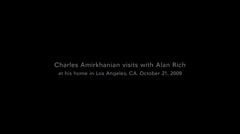Pierre Boulez on Music, 1957
Digital Audio
Event Type
InterviewsOrigin
Robert Erickson ArchiveIdentifier
C.1957.03.XX.c2Program Length
46 minDates
| broadcast| 402 | created
Description
In an program recorded in March of 1957, the French composer Pierre Boulez is interviewed by Robert Erickson and a panel of distinguished and learned musicologists and composers. Sounding at times like a doctoral dissertation defense, the young Frenchman attempts to clarify the role, or lack there of, of development and structure in the avant-garde music being produced by a new wave of European composers such as himself, Karlheinz Stockhausen, and others. Boulez’s comments about music without repetition, climax, or symmetry seem to confound Andrew Imbrie, Robert Erickson, Arnold Elston, and Jack Holloway most of whom represent the traditional, academic ideal of music as a development of themes and motifs. Boulez, whose English while understandable is not fully fluent, uses such analogies as the stream-of-conciseness writing style of James Joyce to highlight his concept of music as a labyrinth, or network of possibilities, that can be listened to in a variety of ways, rather than as a linear narrative with a clearly defined beginning, middle, and end. The idea of music as a relatively arbitrary exploration of choices, tied together by common rhythms, tone rows, and chords, rather than a predetermined theme or melody, is clearly foreign to the panelists, and they can be heard to struggle with it throughout the program. As such, this fascinating and historical interview stands as an example of the challenge that the avant-garde music of the mid-20th Century presented to the established order, and is a testament to Boulez’s perspicacity and personal courage, as well as the graciousness, and even open-mindedness, of the host and panelists.Genres
Avant-gardeNew music
Subjects
Avant-garde (Music)New music
20th century classical
Music -- History and criticism
Related places
Berkeley (Calif.) (was recorded at)Berkeley (Calif.) (was broadcast at)
Related Entities
Erickson, Robert, 1917-1997Boulez, Pierre, 1925-2016
Imbrie, Andrew, 1921-
Elston, Arnold, 1907-1971
Holloway, Jack Edward, 1923-1984
